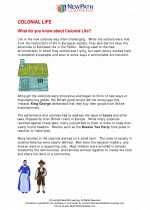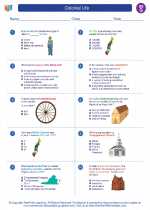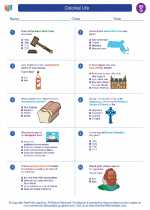Colonial Life
Colonial life refers to the way of life for people living in the American colonies during the 17th and 18th centuries. It was a time of significant historical, social, and cultural developments as European settlers established communities in the New World.
Economic Activities
Colonial life was centered around agriculture, trade, and craftsmanship. The economy was based on farming, with staple crops such as tobacco, rice, and indigo being grown in the southern colonies, while wheat and other grains were cultivated in the northern colonies. Trade with Europe and other colonies was also vital for the economy, and skilled craftsmen produced goods such as furniture, textiles, and tools.
Social Structure
The social structure in the colonies was hierarchical, with wealthy landowners and merchants at the top, followed by farmers, craftsmen, and laborers. Slavery was also a significant part of colonial society, particularly in the southern colonies, where enslaved Africans worked on plantations.
Religion
Religion played a crucial role in colonial life, with various colonies being founded by religious groups seeking freedom from persecution. The New England colonies, for example, were predominantly Puritan, while the Middle Colonies had greater religious diversity, including Quakers, Catholics, and Jews.
Government and Politics
Each colony had its own system of government, with a governor appointed by the king of England. Some colonies, such as Virginia and Massachusetts, had elected assemblies that played a role in local governance.
Cultural Practices
Colonial life was influenced by the cultural practices of the European settlers, as well as interactions with Native American tribes. Traditional crafts, music, and storytelling were important parts of colonial culture, and communal gatherings such as barn raisings and quilting bees were common.
Study Guide Questions
- What were the primary economic activities in the American colonies?
- Describe the social structure of colonial society.
- How did religion influence colonial life?
- What role did government and politics play in the colonies?
- What were some cultural practices in colonial America?
Studying colonial life provides valuable insights into the origins of American society and the diverse cultural influences that shaped the nation. By exploring the economic, social, religious, political, and cultural aspects of colonial life, students can gain a deeper understanding of this formative period in American history.
[Colonial Life] Related Worksheets and Study Guides:
.◂Social Studies Worksheets and Study Guides Seventh Grade. Colonial Life

 Worksheet/Answer key
Worksheet/Answer key
 Worksheet/Answer key
Worksheet/Answer key
 Worksheet/Answer key
Worksheet/Answer key
